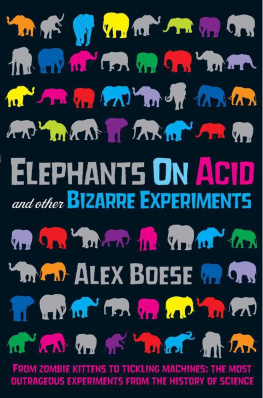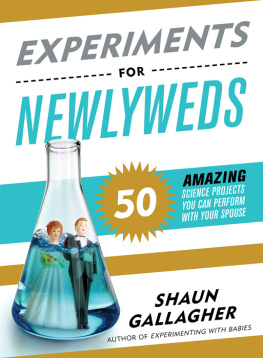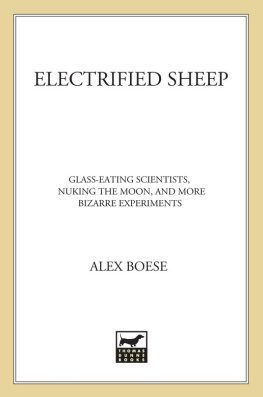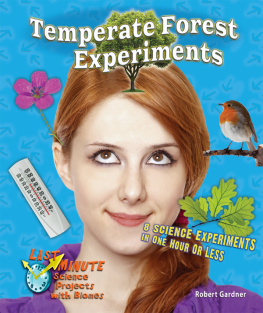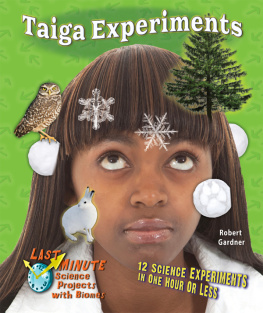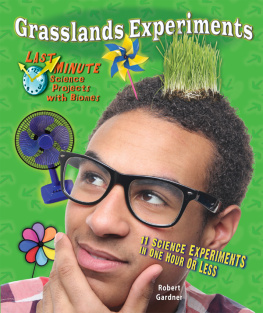Alex Boese
Elephants on Acid
and Other Bizarre Experiments
BROUGHT TO YOU BY KeVkRaY
PAN BOOKS
INTRODUCTION
In the following pages you will encounter elephants on LSD, two-headed dogs, zombie kittens, and racing cockroachesto name just a few of the oddities that await you. Some of these oddities might shock you. Others might amuse you. Still others might make you think, That cant be true! However, I assure you, unless stated otherwise, its all true. This is definitely a work of nonfiction.
All of these strange phenomena share one thing in common: They have all played starring roles in scientific experiments. What youre holding in your hands is a collection of the most bizarre experiments ever conducted. No knowledge of science is needed to appreciate them, just curiosity and an appreciation for the odd.
The criteria for inclusion: Did an experiment make me chuckle, shake my head in disbelief, grimace with disgust, roll my eyes, or utter a shocked exclamation? Did it force me to wonder what kind of imagination, twisted or brilliant, could have dreamed up such a thing? If so, it went on the must include pile. As for the question of scientific worth, some of these experiments are brilliant examples of the scientific method; others are not. Mad scientists, geniuses, heroes, villains, and fools all rub shoulders here.
I first encountered the bizarre-experiment genre in the mid-1990s as a graduate student studying the history of science at the University of California, San Diego. My formal studies focused on all the usual suspectsDarwin, Galileo, Newton, Copernicus, Einstein, et al. But scattered throughout the texts assigned by my professors were references to little-known, intriguing tales about crackpots and mad experimenters. These secondary tales were far more interesting to me than the primary material I was supposed to be learning. Soon I found myself in the library chasing down those stories.
Fast-forward to 2005. I had built a kind of career kind of because my friends and family insist what I do is too much fun to be a real jobout of studying another offbeat subject I encountered during the seven years I spent at grad school. That subject was hoaxes. Think Orson Welless 1938 War of the Worlds broadcast or the Piltdown Man. I created a Web site about hoaxes, museumofhoaxes.com, and authored two books on the topic.
One day I was having lunch with my American editor, Stacia Decker. As we ate our meals, she told me about an unusual experiment involving a researcher who raced cockroaches. She had heard the story from her sister. Apparently, a scientist had built a little stadium, complete with stands in which other roaches could sit to watch the races. (You can read more about the roach stadium in chapter five.) Bizarre experiments would make a pretty good topic for a book, she suggested. It would, I agreed, as I thought back to all the material I had encountered in graduate school. The book youre reading now is the result of that conversation.
Shifting from hoaxes to bizarre experiments continued my interest in weird stuff. But I also came to realize that hoaxes and bizarre experiments share many features in common.
An experiment starts when a researcher looks at a situation and thinks, What would happen if I changed one part of this? He or she performs an experimental manipulation and observes the results. A hoax proceeds in essentially the same way, except that the manipulation takes the form of an outrageous lie. Of course, as well see throughout this book, the manipulations performed by researchers also frequently involve deception. Experimenters sometimes rehearse for days, perfecting the elaborate ruses theyre going to foist on their unsuspecting subjects. In these cases, the line separating hoaxes and experiments is almost indistinguishable.
The big difference between hoaxes and bizarre experiments is that experimenters wrap themselves in the authority of science. They claim as their motive the desire to advance knowledge, whereas hoaxers are often just trying to get a laugh or perpetrate a scam. This sense of gravity is what lends bizarre experiments their particularly surreal quality. Its that odd combination of apparent seriousnesswhite-lab-coat-wearing researchers toiling dispassionately to further the limits of knowledgemixed with a hint of mischief, eccentricity, or, in some cases, seeming insanity, that provides the frisson of weirdness. To preserve this effect, Ive avoided including any experiments conducted in a spirit of jest. All the research in the following pages was undertaken quite seriously. To me, this makes these stories all the more fascinating.
Let me wrap up these introductory remarks by addressing a few questions that may occur to you as you read this book:
Hey, Where are the Nazis?
I wouldnt mention this, except that the Nazi death-camp experiments are apparently what many people think of first when the subject of bizarre experiments comes up. At least, whenever I told people I was writing a book about bizarre experiments, the most common response I received was, You mean, like the Nazi experiments?
I have not included any Nazi research in this book. First, because I didnt intend the book to be a catalog of atrocities. Second, because I wanted to explore actual scientific researchnot sadistic torture disguised as science, which is what I consider the Nazi experiments to be.
How can one distinguish between the two? A couple of guidelines suggest themselves. First, once an experimenter starts purposefully killing people, his research instantly ceases to be legitimate. The second rule is more subtle: Genuine scientists publish their work. When a researcher submits his work for publication, he offers it up to the scrutiny of the scientific community. And when an established, respected journal accepts the submission, this suggests other scientists agree it deserves wider dissemination and consideration. It doesnt mean the work is good science, or ethically justifiedespecially when judged by present-day standards. But it does mean that, for better or worse, the research cannot be denied a place in the history of science. Sometimes extenuating circumstances prevent a researcher from publishing his work, but 99 percent of the time, the publication rule is a useful guideline for identifying real science.
Wheres my favorite bizarre experiment?
Maybe theres a bizarre experiment thats a particular favorite of yours, and you discover thatuh-ohit isnt in here. It could happen. The book format does not permit unlimited space. Forced to pick and choose from a wide field of possibilities, I ultimately settled on ten themes, each of which became the focus of a chapter. If an experiment didnt relate to one of these themes, I put it aside.
How can I find out more about an experiment?
I dont dwell too long on any one subject. If all went as planned, this should make the book fast-paced and easy to read. I hope that people who wouldnt normally read a book about science might enjoy these stories. I joke that its a toilet readers guide to sciencewhich is why I have included chapter eight specifically for this audience.
This format means that each vignette presents a condensed account of what is often a very complex subject. Ive placed a single reference at the end of each vignette. This reminds you that the story you just read is real. I wasnt making it up. But Ive also provided additional references at the end of the book so that readers can pursue in greater depth any topic that whets their interest.
One more comment, then Ill let you get on to the good stuffthe experiments.
Although this book may, at first glance, resemble a kind of circus parade of oddities (led by an elephant on acid, no less), my intention is not to trivialize scientific research or the experimenters who appear in the following pages. Quite the opposite. To me, what these stories are really about is people consumed by insatiable curiosity.

